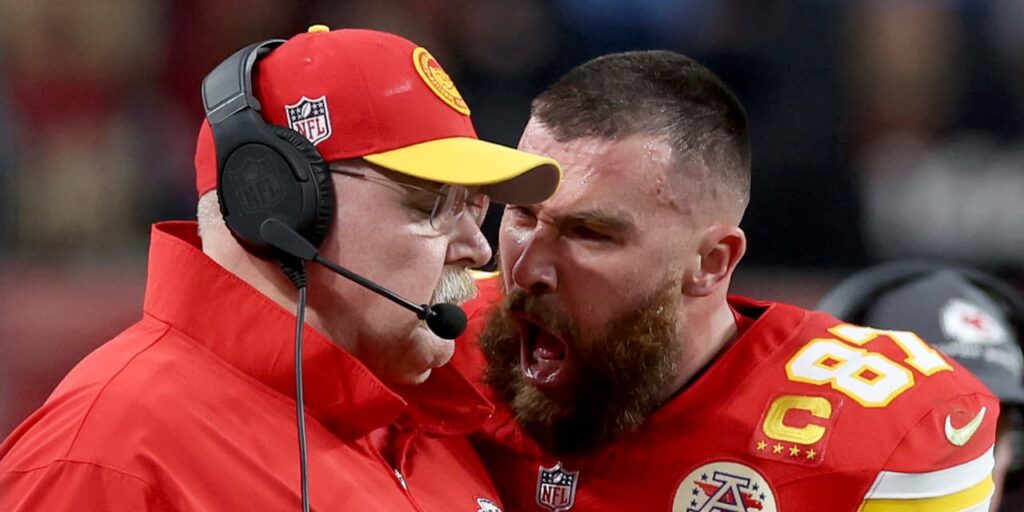It’s a situation common to almost any work environment: An employee thinks a boss has made a boneheaded call and it suddenly leads to an ugly confrontation.
Among the headline-grabbing moments from Sunday’s big game between the Kansas City Chiefs and the San Francisco 49ers came when Chiefs tight end (and Taylor Swift romantic interest) Travis Kelce angrily confronted his coach, Andy Reid, in the second quarter.
The clash, in which Kelce bumped Reid and shouted at him, seemingly resulted from the fact the star player was kept out of the game for a brief while. During that time, another Chiefs player, running back Isiah Pacheco, fumbled the ball and lost the team an opportunity to score in the process. Commentators said Kelce was clearly making the point he needed to be on the field.
In the end, the situation didn’t affect the outcome of the game, since the Chiefs won it in overtime by a score of 25-22. But some have already said that it has affected their own view of Kelce, and speculated about whether it would have an impact on his relationship with Swift.
For their part, Kelce and Reid have put the issue past them — or at least so they implied in their post-game comments. “I was just telling him how much I love him,” Kelce joked of the incident, while Reid said of Kelce and his fiery temperament, “He keeps me young … Normally I’d give him a little bit [back], but I didn’t have [my] feet under me.”
But the situation begs the question of how Kelce could have handled things differently in the first place. And, in turn, what lessons we can take from that and apply to our own workplace.
MarketWatch spoke to a variety of professionals — from human-resource experts to an employment attorney — to see what they said. Here are five suggestions:
Make sure never to cross certain lines
It’s never acceptable to lose your cool at work, experts say. But it’s especially not acceptable to get physical, as Kelce did in bumping Reid. “Certainly, he crossed the line,” said Paul Lopez, a labor and employment attorney with the South Florida-based firm ofTripp Scott. Lopez added that such actions can result in legal claims and liability issues because employees — and yes, that includes bosses (or coaches, in the case of Reid) — need to know they can feel safe on the job.
Always pause — and breathe — before you react
As angry as you might be in a work situation, experts advise that you pause before you respond. Essentially, your feelings are running wild and the reaction becomes a physical one, triggered by hormones, explained Dr. Catherine Toomer, a South Carolina-based family physician who runs a health and wellness center and often counsels patients on dealing with stress.
Toomer and others say the solution is to give it some time — and take some deep, hormone-calming breaths — so that you can approach things with a more level-headed demeanor. Otherwise, the situation “becomes more about the emotions” generated rather than the issue at hand, Toomer said.
Of course, in the heat of a major sporting event, there may not be much time for a breather. But experts say even if Kelce paused long enough for a literal breath, he might have been less hot-headed.
Take things private
Another major mistake made by Kelce: He aired his frustrations in public — in fact, in front of a television audience of tens of millions. Experts say it’s almost always a bad move to challenge a boss in front of others because it has the potential to make the boss look bad and weaken their position. In Kelce’s case, he potentially “undermined the legitimacy” of all of Reid’s on-field decisions by bringing his personal frustrations with the coach to everyone’s attention, said Dr. Jenny Woo, a researcher and educator who advises companies on dealing with emotional situations.
The obvious solution? Have the conversation out of view. Perhaps that’s not as easy in the middle of the Super Bowl, but a locker-room chat during halftime could have served the purpose, experts suggest.
Channel your anger in a positive way
Don’t think of anger as a bad thing per se — that is, it’s only bad if you let it get the best of you. Instead, experts say, if you can keep from going over the top and screaming at your boss (or worse), you can actually channel your frustrations into a better performance on the job — or, in Kelce’s case, on the field.
“A little bit of anger or passion helps to fuel the action we need to take,” said Christy Pruitt-Haynes, a veteran human-resources professional who works with the NeuroLeadership Institute, a New York-based organization that focuses on executive development.
Make the best of a bad situation
OK, so you’ve had a meltdown with your boss at the office — or the Super Bowl. Does that mean you’ve ruined your career? Perhaps not.
Experts say some good can come out of these situations, provided you haven’t completely burned any bridges and have made the necessary apologies. At the very least, you’ve made your frustrations known, which can potentially guide your boss into thinking how best to utilize your skills and talents in the future. And with the passage of time, the incident may serve to strengthen a bond between boss and employee.
Part of the reason for that is you’ve shown you care about your job performance, no matter how badly you communicated that in the heat of the moment. Or, as Pruitt-Haynes observed, it’s a lot better than becoming the apathetic employee whose only solution is to sit on the sidelines.
“When you do have a blow-up, it’s showing there’s still something you’re fighting for,” she said.
Read the full article here












